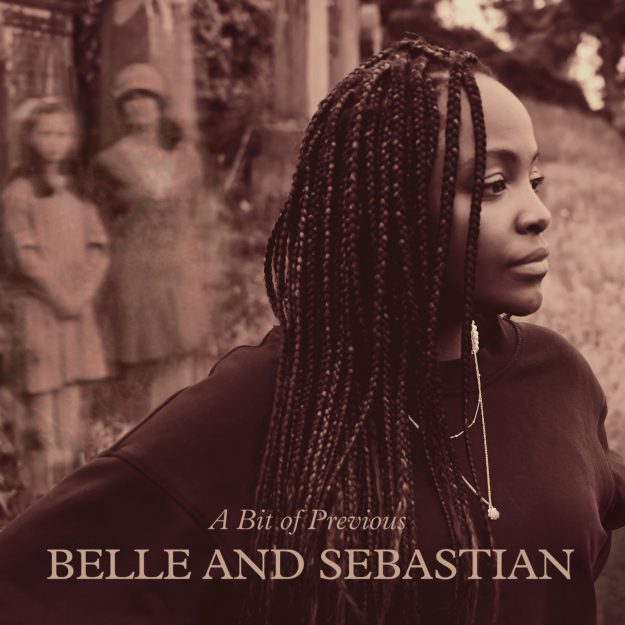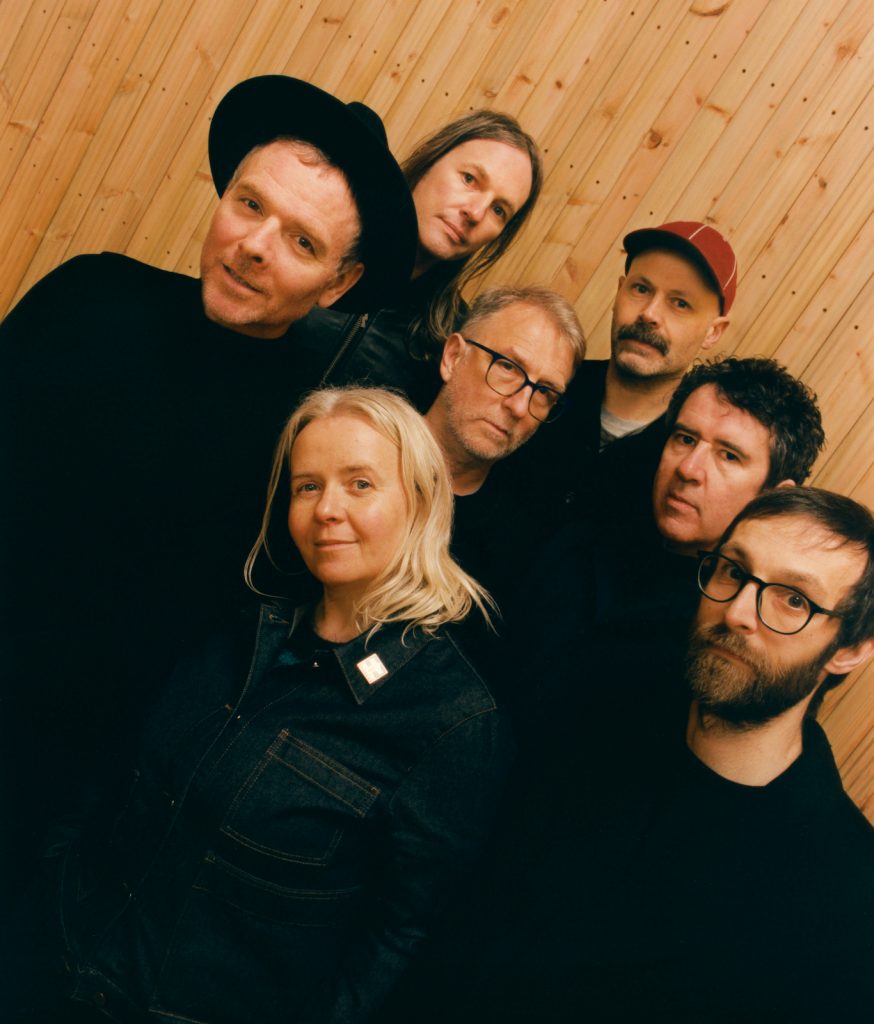Buddhism might not be the first theme listeners think about when they listen to Scottish band Belle and Sebastian’s new album A Bit of Previous (Matador Records), out today. But a discerning ear will pick up references to past lives, infinite rebirth, universal compassion, and impermanence. (Read the album’s title again.) Tricycle caught up with Stuart Murdoch, Belle and Sebastian’s frontman, about his Buddhist practice, his attention to the everyday in his lyrics, and how these come together in the beloved indie pop band’s first album in seven years.
Tricycle: In discussing your new album, A Bit of Previous, you reference some Buddhist notions like past lives, infinite rebirth, and universal compassion. These seemed more than recurring motifs, but almost unifying themes. Can you talk a little about the series of events that brought Buddhism into your life and music?
Stuart Murdoch: Well, it’s been percolating for a long while. Spiritually, my background isn’t in Buddhism but Christianity. I’ve been a Christian for a long time, but about eight years ago, just after the birth of my first child, I was going through a difficult period and decided to investigate meditation. So I went down to my local Buddhist center, the Kadampa Buddhist Center, looking to meditate and got hooked into the Buddhist teachings. I was really surprised because at that point, I was 45 years old, and I never expected something to come along that would change me so radically. But it did. It changed my way of thinking. I think it changed me as a person. It helped me deal with everything I was going through at the time. When something goes in that deep, it’s natural that it ends up coming out in your writing and in your music.
Your music does so many things. Your songs are beautiful, they’re touching, but they’re also funny in a quotidian way. They have this really “everyday” quality to them. What happens to your music when your “everyday” is shifted in the way you’re describing?
For me, it would be difficult to sit down and write a song that was only about higher things. I think that wouldn’t really be my style at all. And so I stick with the quotidian, I stick with the everyday. I stick with my everyday experience. And, you know, normally I just let songs flow to me. I don’t have to try too hard. But the interesting thing is that I just can’t help coming back to the sort of principles that I’ve been learning about in the temple. I’ve noticed now that I tend to wrap quite a lot of Buddhist advice up in the song, and it really comes out in the way that I’m speaking to the characters of my songs.
The single “Unnecessary Drama” chugs along in this kind of beautiful squall, and then we hear the line, “Enjoy the fervor of your love life, because it doesn’t last.” This is a really beautiful and Buddhist sentiment, almost like a line from the Dhammapada.
[Laughs] Absolutely. And that’s probably the least Buddhist song on the LP because it’s a real rocker. But it does have a little bit of the dharma in there.

Did you find that your community around you, overtly or implicitly, was transformed with you?
Two years ago, when the pandemic first arrived in Glasgow and everything shut down and we couldn’t make music anymore, what most natural for me was to start leading some online classes. I gave a class every Sunday night where I would lead a meditation. Initially it was mostly Belle and Sebastian fans who were curious and people who were sort of stressed out with the pandemic. But that was precisely the reason that I thought it would help to try and meditate with people and offer them a way towards a peaceful mind. I’ve carried on with that for the last two years.
What an amazing thing to have that both for yourself and for others. It must have really centered you through the first part of the pandemic.
Absolutely. It was totally as much for me as for anybody, because if you’ve ever had a chance to lead a meditation or teach the dharma, you’ll know it’s very rewarding. Sometimes you only find out what you know when you try to pass it on to other people.
Oh, for sure. Especially for beginning Buddhists you hear often, “I’m so excited by these ideas. But how does it apply to my life?” And it seems like I hear you saying like that from the very beginning you’ve found your studies immediately applicable to your daily life, and immediately informing your everyday life. How did you so quickly make that connection between these ancient texts, and your everyday—these quotidian things that so preoccupy us all?
I think the Kadampa teachings, the Lam rim [“stages of the path”], are all about finding a peaceful mind. We’re digging down and trying to quiet the mind. In the past, I would get angry and frustrated at many aspects of my life or what is happening in the world. You know you can get angry reading the news, or if someone knocks into you on the street, or somebody is making too much noise or driving you crazy at work. So, one of the things that I’ve learned is to reimagine these problems. There’s this metaphor of looking out to the world as if it’s covered in broken glass. The broken shards are all the problems of the world. You could walk around and try to cover over all the broken glass, but you’ll never do it. It’s impossible. So, the best thing to do is to put on a good pair of boots. You have to change yourself and it’s only by changing yourself, having this armor for yourself in the dharma, that you are going be able to deal adequately with the problems of the world.
Are there particular styles of meditation or techniques that have been most effective or that you find yourself returning to over and over as your kind of armor?
On the meditation side of things I keep it very simple. I feel that when you’re quiet in the mind you can bring anything into your heart center. And then it naturally becomes a part of you. Once you focus on that, you can really meditate on anything. In the sessions I lead, we usually start with a breathing meditation just to bring everybody in. And then once the mind is calm, once the mind is focused on a more singular object, you can bend the object–whether you’re just using bright light, positivity, or you’re focusing on health and compassion. It’s pretty simple stuff. As well, one of the other things I love so much about the Buddhist practices is that they’re very scientific. If you don’t want to, you don’t have faith in things that you can’t see, you’re very welcome at a Buddhist center, because you always start scientifically and practically—with the mind. If you say meditation to a lot of people they might think, wow, that has to have something to do with faith or God or something. But really meditation is just being able to focus on a virtuous object, which means focus on a good emotion. And then that emotion will grow in you and become part of you. It is very, very practical.
You discussed some challenges that you faced in your life that led you to explore meditation and Buddhism. What was the process like for transforming the challenges that have come up in your life?
The elephant in the room for me is that I still go to church, and I’ve been going to church for 14 years. I’m not a practicing Christian, but I have certain beliefs. My teachers in the Buddhist center, they’re very cool about this. And they’re always explaining that everybody has different karma. Everybody has different people and things that they go to refuge for. Even just the other day, my teacher was saying that I go to Buddha, but you might go to Jesus or God or even your Aunt Agnes–who was the wisest person that you ever knew. I love that it’s very open. Even a bit further down the line when it gets a bit more “Buddhist,” it’s not so much that there’s a contradiction but more that the practices start getting very precise. And I feel that at the minute my karma isn’t leading me that way.
Thank you for subscribing to Tricycle! As a nonprofit, we depend on readers like you to keep Buddhist teachings and practices widely available.
